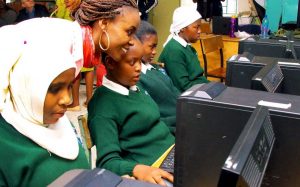advertisement
Microsoft AppFactory launched in Nanyuki

Kenya’s award-winning rural internet access provider better known as Mawingu Networks based in Nanyuki town, has expanded its operational potential by launching an AppFactory in partnership with Microsoft 4Afrika.
Mawingu Network’s new AppFactory was launched March 23, with the aim to develop the digital skills, coding capabilities and employability of young graduates living in Nanyuki and surrounding villages located nearly 200km from Nairobi city.
“The AppFactory will turn young people into highly competent, in-demand ICT professionals. Local companies, including ourselves, need more of this talent, especially in an increasingly digital world,” says Tim Hobbs, Director and CEO of Mawingu Networks.
advertisement
“The AppFactory will turn young people into highly competent, in-demand ICT professionals. Local companies, including ourselves, need more of this talent, especially in an increasingly digital world,”
Tim Hobbs, Director & CEO Mawingu Networks.
Mawingu Networks’ new popular facility is the 16th AppFactory to launch in Africa, with others in Nigeria, Kenya, South Africa, Egypt, Ethiopia, Ghana, Malawi, Mauritius, Uganda and Rwanda. In 2017, over 500 developers graduated from the Africa AppFactories, with 85% securing full-time jobs within three months of graduating.
Since 2013, this low-cost internet access provider has been providing Nanyuki town with affordable and reliable Wi-Fi, using low-cost wireless technology and solar power. With support and funding from both Microsoft and OPIC, Mawingu has grown from 15 to 1,100 Wi-Fi hotspots across the Nyeri, Laikipia and Meru counties.

advertisement
Wanja Gitonga, Communications Manager Microsoft 4Afrika takes interest in what students of Sweetwaters Secondary School were deriving from the fruits of internet provided by Microsoft in conjunction with Mawingu in Nanyuki.
Lutz Ziob the Dean of the Africa Academy Microsoft explained that there is a huge demand for young Africans who possess modern information technology skills. So, they at Microsoft came up with a programme for their partners around Africa to train modern developers to meet the demand.
“A lot of skills development programmes happen in and around big cities, benefitting largely urban youth,” said Lutz Ziob.
He added, “By working with an innovative, local company in Nanyuki, we are demonstrating our commitment to extending the reach of opportunities to youth and small businesses across the country. This is in line with our global mission to empower every person and organisation on the planet to achieve more. It also supports Kenya’s 2030 vision, which aims to become a middle-income country and provide a higher quality of life to all its citizens.”
advertisement
“By working with an innovative, local company in Nanyuki, we are demonstrating our commitment to extending the reach of opportunities to youth and small businesses across the country. This is in line with our global mission to empower every person and organisation on the planet to achieve more. It also supports Kenya’s 2030 vision, which aims to become a middle-income country and provide a higher quality of life to all its citizens.”
Lutz Ziob, Dean of the Africa Academy Microsoft
Mawingu’s history with Microsoft 4Afrika extends back to 2013, when they piloted TV white spaces technology to deliver high-speed, low-cost connectivity in last-mile areas. The potential of Mawingu’s business model was soon recognised by the Overseas Private Investment Corporation (OPIC), who in 2016 committed a $4.1 million loan to help Mawingu commercially expand their operations into rural communities.
In Nanyuki, the immediate direct beneficiaries including teachers says are now able to afford the use of ICTs for research and teaching students by adding video to written notes, making it easier for the students to understand.
An ICT technician at Sweetwaters School Judy Nyambura said their partnership with Mawingu Networks had changed the mood in their school with teacher no longer relying on teaching in classrooms using chalk and the board, it has enabled them to research and using ICTs like videos for demonstration.
Claire Njeri, a student at the school confirmed that using the video lessons attained has helped her remember answers during exams. “It is benefitting me, because the internet has a lot more things to learn than inside a classroom. Using computers, we learn many things and those students who do not use the internet do not know more than I do. I use the computers here to research and expand on my knowledge especially on subjects my teacher has not explained well,” Njeri said.